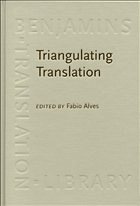Main description:
This book contains a selection of papers presented in a subsection on translation process analysis at the II Brazilian International Translators' Forum, held on 23-27 July 2001. The volume builds on the notion of triangulation, i.e., the combined use of different methods of data elicitation and analyses, to discuss methodological issues and actual experimental methods in the field of translation process research. Grouped in three parts, the seven contributions raise issues concerned, among others, with the translation-pragmatics interface, the role of inter-subjectivity, the attempts at modeling what accounts for translation competence, and the effect of think-aloud on translation speed, revision, and segmentation. The volume also examines the process of translation in terms of relevant measurements which can validate some of the instruments used in the triangulation approach and fosters the application of triangulation as a pedagogical instrument to be applied to translators' training. The book will certainly find an audience among translation scholars doing experimental work and students and practitioners interested in capturing the translation process.
Table of contents:
- Foreword
- Triangulation in process oriented research in translation
- I. Theoretical perspectives
- A Relevance Theory approach to the investigation of inferential processes in translation
- Controlling the process
- Building a translation competence model
- II. Monitoring the process
- Effects of think aloud on translation speed, revision, and segmentation
- The influence of working memory features on some formal aspects of translation performance
- III. Pedagogical applications
- Patterns of dictionary use in non-domain-specific translation
- Using think-aloud protocols to investigate the translation process of foreign language learners and experienced translators
- Name index
- Subject index
This book contains a selection of papers presented in a subsection on translation process analysis at the II Brazilian International Translators' Forum, held on 23-27 July 2001. The volume builds on the notion of triangulation, i.e., the combined use of different methods of data elicitation and analyses, to discuss methodological issues and actual experimental methods in the field of translation process research. Grouped in three parts, the seven contributions raise issues concerned, among others, with the translation-pragmatics interface, the role of inter-subjectivity, the attempts at modeling what accounts for translation competence, and the effect of think-aloud on translation speed, revision, and segmentation. The volume also examines the process of translation in terms of relevant measurements which can validate some of the instruments used in the triangulation approach and fosters the application of triangulation as a pedagogical instrument to be applied to translators' training. The book will certainly find an audience among translation scholars doing experimental work and students and practitioners interested in capturing the translation process.
Table of contents:
- Foreword
- Triangulation in process oriented research in translation
- I. Theoretical perspectives
- A Relevance Theory approach to the investigation of inferential processes in translation
- Controlling the process
- Building a translation competence model
- II. Monitoring the process
- Effects of think aloud on translation speed, revision, and segmentation
- The influence of working memory features on some formal aspects of translation performance
- III. Pedagogical applications
- Patterns of dictionary use in non-domain-specific translation
- Using think-aloud protocols to investigate the translation process of foreign language learners and experienced translators
- Name index
- Subject index

